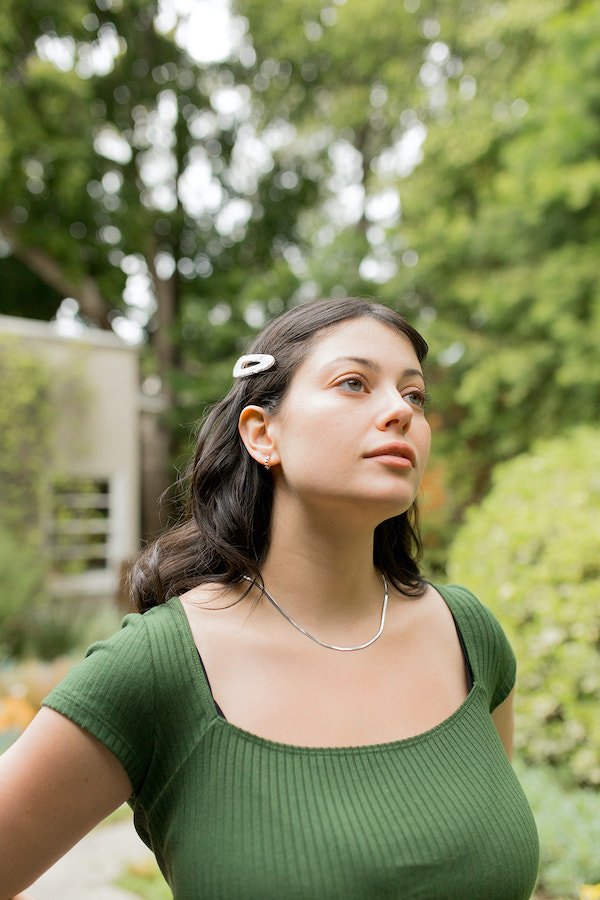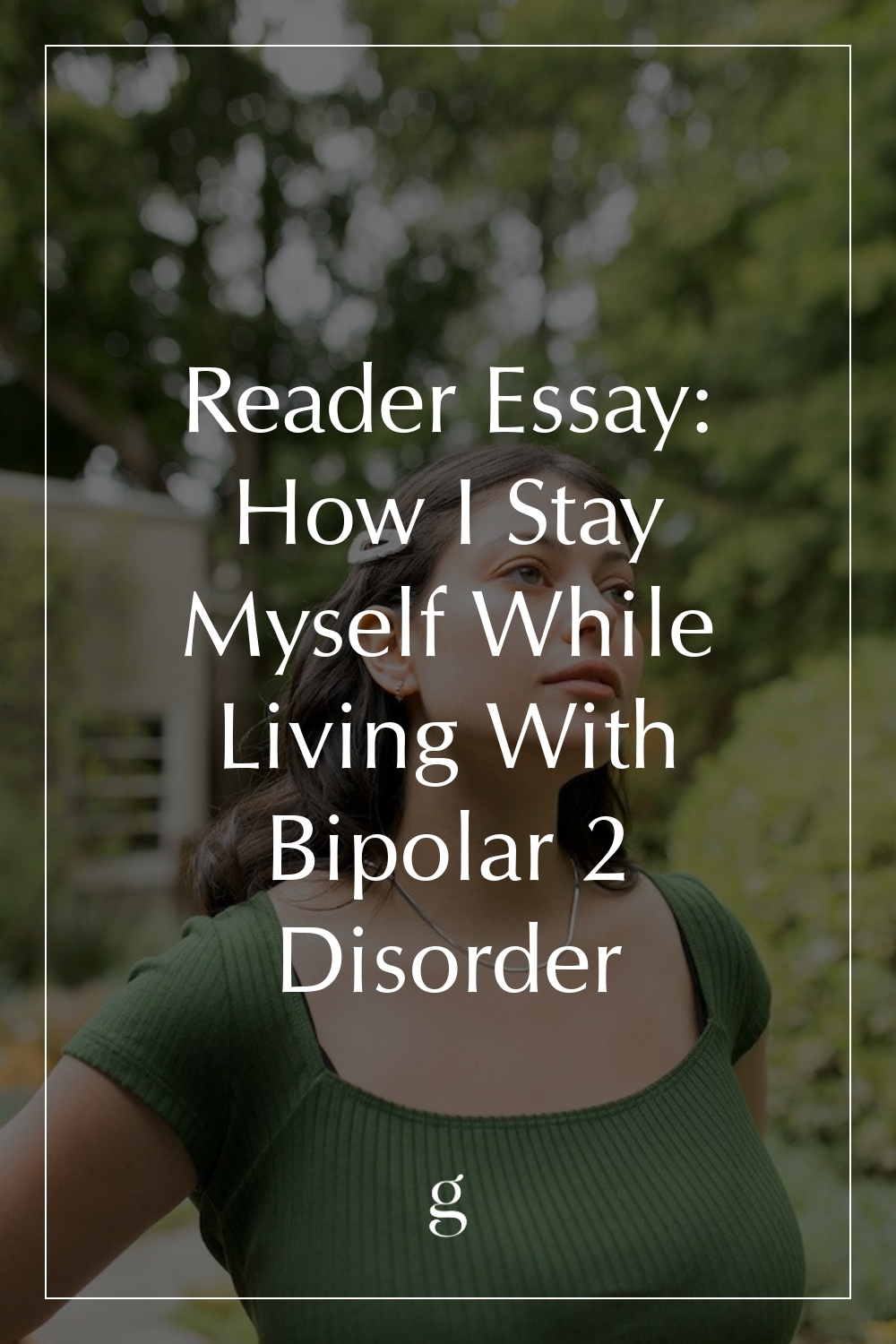
Reader Essay: How I Stay Myself While Living With Bipolar 2 Disorder
This essay was reader-submitted for our Reader Essay Series on themes of motherhood, mental health, and personal transformation.
Before I get into the details, here’s what you need to know about me:
Earlier this year, I was diagnosed with bipolar 2 disorder at 28 years old. Bipolar 2 focuses on more of, what I would call, a mood fluctuation of highs and lows that wouldn’t be classified as overly extreme. It’s estimated that three to four percent of adults in the United States have dealt with bipolar disorder in their lifetime, with more women being diagnosed than men.
“I’ve always been the solid foundation in my relationships—with friends, family, and partners.”
It all started late last year, in October 2021, when things began to unravel. Suddenly I was overwhelmed by even the smallest of tasks, let alone the things my loved ones needed from me. My best friend had been cheated on by her fiance, my sister and mother couldn’t get along, my boyfriend had (and always has had) depression.
I’ve always been the solid foundation in my relationships—with friends, family, and partners. I’m good at mediating others’ conversations; I know how to choose logic over emotion. But starting that October, I felt so lost and confused in my mind. I was having anxiety attacks two to three times a week; I was also exhausted, always wanting to nap, always dragging my feet. All my usual superpowers that allowed me to step outside my emotions had diminished.
I hadn’t been to a psychologist in over 10 years when I made the appointment to try and figure out what was happening to me. “I feel hyperactive for days on end, usually followed by what feels like depression or at least exhaustion,” I explained to the therapist during our second session—it took me a bit to open up about what I was feeling in my body. She asked me a series of questions as though I was taking a test.
“Would you say you’re fidgety when you’re hyperactive?”
Yes.
“Do you talk really fast and feel like you have to share every thought at times?”
Yes.
“Do you have any issues sleeping and if so, is it always?”
Yes. I can go from sleeping seven to nine hours to four to five hours a night and feel completely fine, as though I didn’t need to sleep in the first place.
“Would you say you’re a spontaneous spender?”
No—except for when I bought a car on a whim. Or the times when I’ve placed spontaneous online orders and then forgotten about what I bought or why I bought it.
“I flirted with the idea that maybe, just maybe, I had tricked my psychologist into thinking I have bipolar 2 so that I would have an excuse for my unexplained actions.”
At my next session, my psychologist diagnosed me with bipolar 2. And it took me some time to come to terms with my diagnosis. I flirted with the idea that maybe, just maybe, I had tricked my psychologist into thinking I have bipolar 2 so that I would have an excuse for my unexplained actions. Yes, that was it, I had outwitted someone with multiple degrees, including forensic psychology.
Alternatively, I toyed with the idea that I had control over when I was hyperactive and could just make it stop. The beauty of hypomania—periods of overactive and excited behavior that lasts up to four days—is that, generally, you don’t know it’s happening until after the fact. At least in my case. I have a few days of euphoric motivation where I can complete 50 million tasks in the space of an hour while running off only four hours of sleep.
Seven months later, I can confidently say that my bipolar and I are becoming friends. She taps me on the shoulder from time to time, and we have plenty of fun. She’s also helpful when I have a lot of work or errands to run.
My least favorite part is how she makes me feel when she’s done for the day—drained, hopeless, exhausted; but I don’t hold a grudge. I hold her hand, and she holds mine. The ‘baseline me’ has learned a lot and pulled some things together to help manage risk.
And I’ve been constantly reassured that I am still me—just with a diagnosis. I’ve made a personal choice to manage my bipolar without taking medication. So far, so good. Lists have been helpful, as have a few lifestyle changes recommended by my therapist. I’ve swapped my coffee for matcha and my melatonin dosage for a delicious lemon balm peppermint magnesium drink. I also began swapping out energetic music for informative podcasts; I’m learning to balance my social life with more “me” time.
“I’ve been constantly reassured that I am still me—just with a diagnosis.”
I’ve found some ways that help. Here’s a list that keeps me, me:
Make lists on your phone or on paper to remove everything from your head. Mark things off as you go.
Avoid caffeine (where possible).
Communicate about your feelings and needs.
Sleep (when she lets you).
Create boundaries and talk to only those who are helpful.
Be kind and compassionate to yourself.
Let yourself feel exhausted.
Regulate/recalibrate.
Watch your favorite TV shows and podcasts whenever you want to.
Listen to Candy by Mandy Moore on repeat (bad and good days).
“It turns out, the superpowers that I had been so fond of weren’t that good for me.”
My diagnosis, while a considerable learning curve, has been a significant turning point for me. It turns out, the superpowers that I had been so fond of weren’t that good for me. I had never given myself the space for my own problems or allowed my loved ones to carry any of my weight. My bipolar 2 forced me to lean on others, to communicate what I’m feeling and what I need and want—this is a new concept for me.
The daunting fact is, if I don’t manage this correctly, I could be putting myself at risk of more frequent hypomanic periods and possible reputable damage. So, while this may have been an extreme measure to teach me a life lesson, I’m happy to be learning it.
Chrystal Knight is a 28-year-old writer from Australia. She works in e-commerce & digital (which she absolutely loves) and has three fur babies—Augie, Lulu, and Koda—with her partner Michael. She’s always been obsessed with writing; whether it be songs, poems or short stories. Say hi on Instagram!
RELATED READING
Featured image includes model Shelly Cochrane wearing shirt by Reformation; jewelry by Apse; hair clip editor’s own





